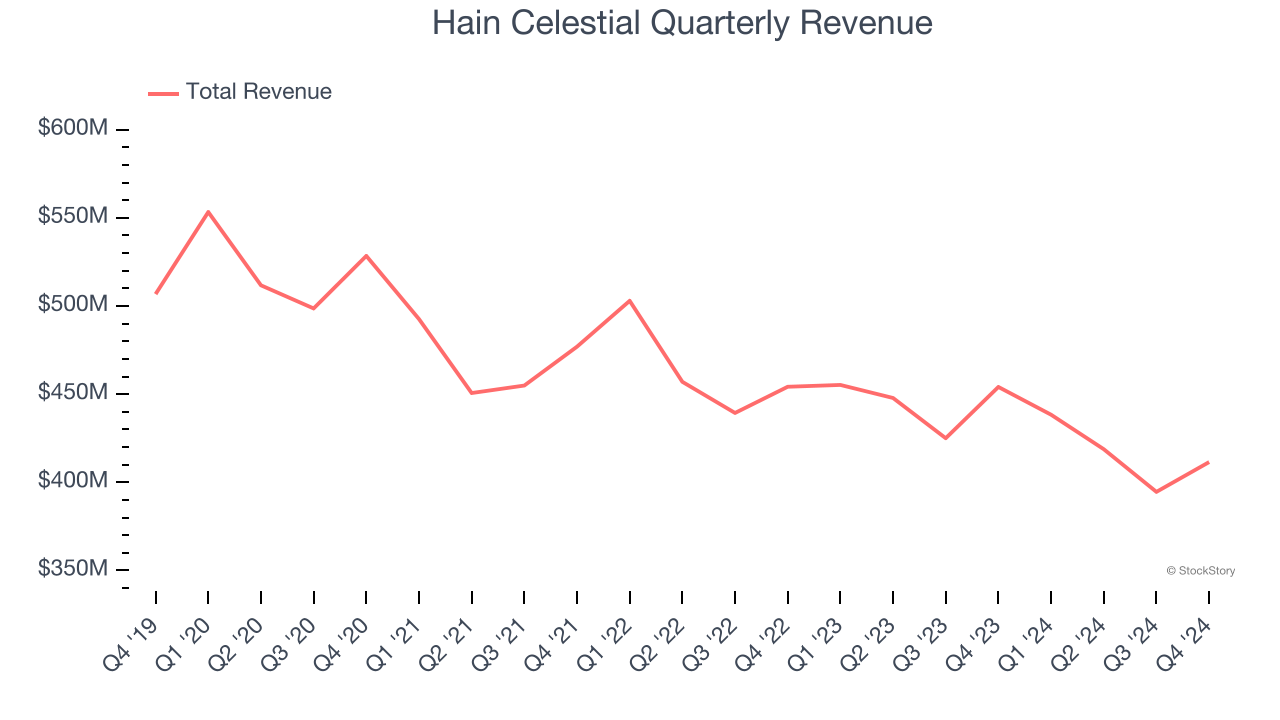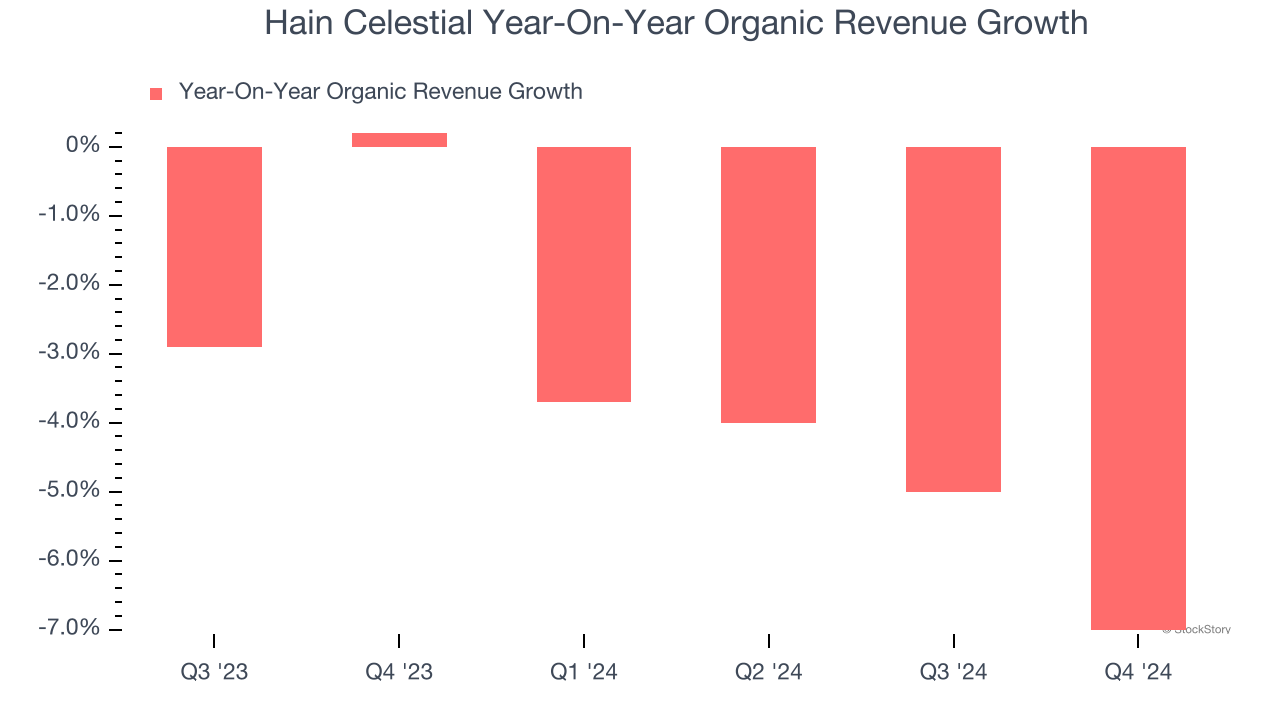
Natural food company Hain Celestial (NASDAQ:HAIN) missed Wall Street’s revenue expectations in Q4 CY2024, with sales falling 9.4% year on year to $411.5 million. Its non-GAAP profit of $0.08 per share was 31.9% below analysts’ consensus estimates.
Is now the time to buy Hain Celestial? Find out by accessing our full research report, it’s free.
Hain Celestial (HAIN) Q4 CY2024 Highlights:
- Revenue: $411.5 million vs analyst estimates of $430.5 million (9.4% year-on-year decline, 4.4% miss)
- Adjusted EPS: $0.08 vs analyst expectations of $0.12 (31.9% miss)
- Adjusted EBITDA: $37.89 million vs analyst estimates of $42.16 million (9.2% margin, 10.1% miss)
- Operating Margin: -22.3%, down from 6.6% in the same quarter last year due to non-cash goodwill and intangible asset impairment charges of $107 million
- Free Cash Flow Margin: 6%, up from 3.3% in the same quarter last year
- Organic Revenue fell 7% year on year (0.2% in the same quarter last year)
- Market Capitalization: $423 million
“Despite challenges in the quarter, we generated strong operating cash flow and further reduced debt. We drove sequential improvement in baby & kids and in our largest category, meal prep. However, sales growth in the quarter was hindered by poor in-store performance in snacks, driven by marketing and promotion effectiveness, and supply chain challenges, both of which we have already taken steps to address. We are confident that the actions taken, combined with promotional timing shifts, confirmed distribution gains, and full infant formula supply, will drive organic net sales growth in the second half of the year," said Wendy Davidson, Hain Celestial President and CEO.
Company Overview
Sold in over 75 countries around the world, Hain Celestial (NASDAQ:HAIN) is a natural and organic food company whose products range from snacks to teas to baby food.
Shelf-Stable Food
As America industrialized and moved away from an agricultural economy, people faced more demands on their time. Packaged foods emerged as a solution offering convenience to the evolving American family, whether it be canned goods or snacks. Today, Americans seek brands that are high in quality, reliable, and reasonably priced. Furthermore, there's a growing emphasis on health-conscious and sustainable food options. Packaged food stocks are considered resilient investments. People always need to eat, so these companies can enjoy consistent demand as long as they stay on top of changing consumer preferences. The industry spans from multinational corporations to smaller specialized firms and is subject to food safety and labeling regulations.
Sales Growth
Examining a company’s long-term performance can provide clues about its quality. Any business can put up a good quarter or two, but the best consistently grow over the long haul.
With $1.66 billion in revenue over the past 12 months, Hain Celestial is a small consumer staples company, which sometimes brings disadvantages compared to larger competitors benefiting from economies of scale and negotiating leverage.
As you can see below, Hain Celestial struggled to generate demand over the last three years. Its sales dropped by 3.9% annually, showing demand was weak. This is a rough starting point for our analysis.

This quarter, Hain Celestial missed Wall Street’s estimates and reported a rather uninspiring 9.4% year-on-year revenue decline, generating $411.5 million of revenue.
Looking ahead, sell-side analysts expect revenue to grow 1.6% over the next 12 months. Although this projection implies its newer products will catalyze better top-line performance, it is still below average for the sector.
Here at StockStory, we certainly understand the potential of thematic investing. Diverse winners from Microsoft (MSFT) to Alphabet (GOOG), Coca-Cola (KO) to Monster Beverage (MNST) could all have been identified as promising growth stories with a megatrend driving the growth. So, in that spirit, we’ve identified a relatively under-the-radar profitable growth stock benefiting from the rise of AI, available to you FREE via this link.
Organic Revenue Growth
When analyzing revenue growth, we care most about organic revenue growth. This metric captures a business’s performance excluding one-time events such as mergers, acquisitions, and divestitures as well as foreign currency fluctuations.
Hain Celestial’s demand has been falling over the last eight quarters, and on average, its organic sales have declined by 3.7% year on year. 
In the latest quarter, Hain Celestial’s organic sales fell by 7% year on year. This decrease represents a further deceleration from its historical levels. We hope the business can get back on track.
Key Takeaways from Hain Celestial’s Q4 Results
We struggled to find many positives in these results. Its revenue missed significantly and its organic revenue fell short of Wall Street’s estimates. The stock traded down 2.8% to $4.54 immediately after reporting.
Hain Celestial’s latest earnings report disappointed. One quarter doesn’t define a company’s quality, so let’s explore whether the stock is a buy at the current price. When making that decision, it’s important to consider its valuation, business qualities, as well as what has happened in the latest quarter. We cover that in our actionable full research report which you can read here, it’s free.
